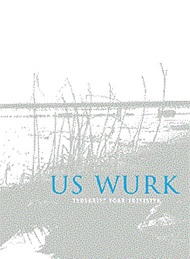Oudfries pligia: een aanzet tot een habitual past tense in het Fries?
Abstract
The class II weak verbs in Frisian are characterized by the absence of adental suffix in the past tense. In the Old-Frisian, obviously written, sources
this is still not the common form, but from the 15th century onwards we find
in charters and in other late Old-Frisian sources the first, still rare attestations
of d-deletion in these verbs, probably indicating a more frequent
occurrence in the spoken language. Only in one verb this development is
already universally applied: pligia, in the sense of ‘used to ..’. Besides the
fact that the past tense is only attested in forms such as pliga, something else
is happening: present tense forms such as pligit not seldomly refer to a
situation in the past. We see here a blurring of the boundaries between
present and past tense, a feature which can be explained by the meaning of
the verb, but probably also attests a first step in the grammaticalization
process, certainly when other factors are taken into consideration (the
morphology, but also the absence of infinite forms).
We see here a clear parallel with the etymological equivalent of pligia in
modern Yiddish: fleg(n) ‘used to ...’. There are differences: modern Yiddish
shares with the Southern German dialects from which it is derived the
absence of preterite forms. In addition, the Yiddish verb has a high text frequency.
However, it shares with pligia a weak lexical content and the almost
complete lack of infinite forms. In certain respects the development towards
grammaticalization has been carried out further in this case: while pligia is
still linked to the following infinitive by to, the Yiddish equivalent shows a
direct connection with the infinitive, without a preposition. In addition, in
the present indicative 3rd sing. the ending -t is lacking, which is also a
feature of auxiliary verbs, mostly praeterito-praesentia. The special situation
in Yiddish has caused some reference grammars to include a separate
category in their discussion of verbs: the habitual past tense. In this study
the Old-Frisian attestations are analysed. There is a beginning of grammaticalization,
but different from the Yiddish (and in a sense from the English semantically cognate
verb used to ...) this was not carried through in modern Frisian. A factor to
take into consideration is that the verb pligia,
characteristic of formal written language, did offer less possibilities for use
in the post-medieval period, during which Frisian lost its position as the
official language.

